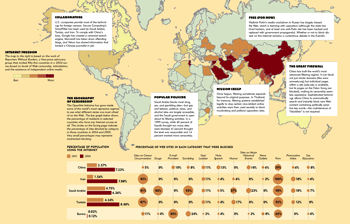Frequent readers will note that AsiaPundit has a love of maps and a fascination with internet censorship. It shouldn’t be any surprise that this grabs his attention. The Atlantic has created a map of the globe color coding countries that censor the internet.:

The Atlantic has created a censorship map based on ONI data. (I’ve archived a local mirror of the map and the accompanying article).
The accompanying article is a bit overzealous in its description of China but I liked that fact that the article specifically highlighted that Internet filtering is not exclusive to China but is spreading — essentially becoming the “norm” — worldwide. In terms of targetted content, porn is defintely targetted but the numbers are skewed by the fact that the use of commercial lists (there are open source lists too) allow countries to block a lot of porn easily. But in terms of significance porn is, in my opinion, of rather low importance. the blocking of several key sources of local language alternative information or an social movement group is much more important. The sgnificance of the content rather than the total number of sites blocked in category seems, to me, to be of more importance but is much harder to measure.
Map and text via Internet Censorship Explorer.
Technorati Tags: censorship, china, east asia, northeast asia
 I’m sorry for vanishing from this space so suddenly last week. The truth was that, by the time of Mr Thaksin’s resignation last Tuesday night, I was feeling very peculiar, to an extent that could not fully be explained by my elation at witnessing history in the making.
I’m sorry for vanishing from this space so suddenly last week. The truth was that, by the time of Mr Thaksin’s resignation last Tuesday night, I was feeling very peculiar, to an extent that could not fully be explained by my elation at witnessing history in the making.

































